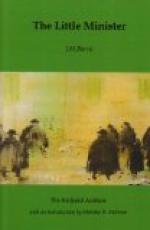“He is dead,” she said at last in a whisper. “Mr. Dishart is dead,” and she sat down quietly.
At that I covered my face, crying, “God help Margaret!” and then she rose, saying fiercely, so that I drew back from her, “There is no Margaret; he only cared for me.”
“She is his mother,” I said hoarsely, and then she smiled to me, so that I thought her a harmless mad thing. “He was killed by a piper called Lauchlan Campbell,” she said, looking up at me suddenly. “It was my fault.”
“Poor Margaret!” I wailed.
“And poor Babbie,” she entreated pathetically; “will no one say, ’Poor Babbie’?”
CHAPTER XXVII.
First journey of the dominie to Thrums during the twenty-four hours.
“How did it happen?” I asked more than once, but the Egyptian was only with me in the body, and she did not hear. I might have been talking to some one a mile away whom a telescope had drawn near my eyes.
When I put on my bonnet, however, she knew that I was going to Thrums, and she rose and walked to the door, looking behind to see that I followed.
“You must not come,” I said harshly, but her hand started to her heart as if I had shot her, and I added quickly, “Come.” We were already some distance on our way before I repeated my question.
“What matter how it happened?” she answered piteously, and they were words of which I felt the force. But when she said a little later, “I thought you would say it is not true,” I took courage, and forced her to tell me all she knew. She sobbed while she spoke, if one may sob without tears.
“I heard of it at the Spittal,” she said. “The news broke out suddenly there that the piper had quarrelled with some one in Thrums, and that in trying to separate them Mr. Dishart was stabbed. There is no doubt of its truth.”
“We should have heard of it here,” I said hopefully, “before the news reached the Spittal. It cannot be true.”
“It was brought to the Spittal,” she answered, “by the hill road.”
Then my spirits sank again, for I knew that this was possible. There is a path, steep but short, across the hills between Thrums and the top of the glen, which Mr. Glendinning took frequently when he had to preach at both places on the same Sabbath. It is still called the Minister’s Road.
“Yet if the earl had believed it he would have sent some one into Thrums for particulars,” I said, grasping at such comfort as I could make.
“He does believe it,” she answered. “He told me of it himself.”
You see the Egyptian was careless of her secret now; but what was that secret to me? An hour ago it would have been much, and already it was not worth listening to. If she had begun to tell me why Lord Rintoul took a gypsy girl into his confidence I should not have heard her.




